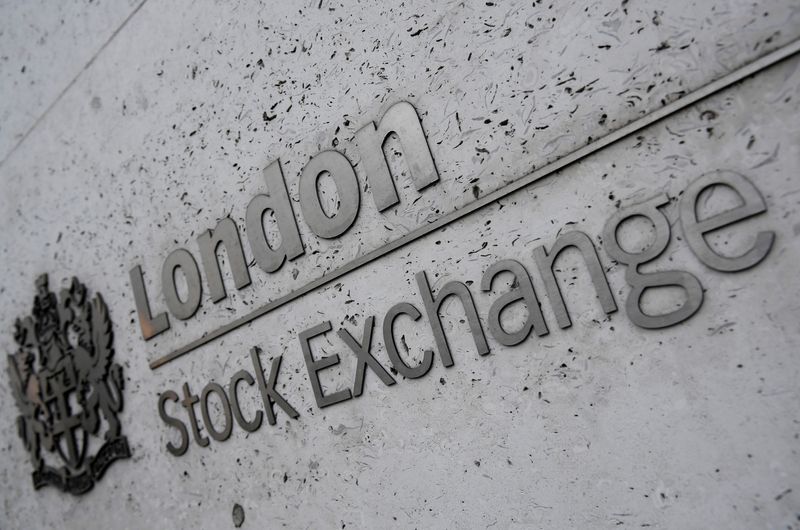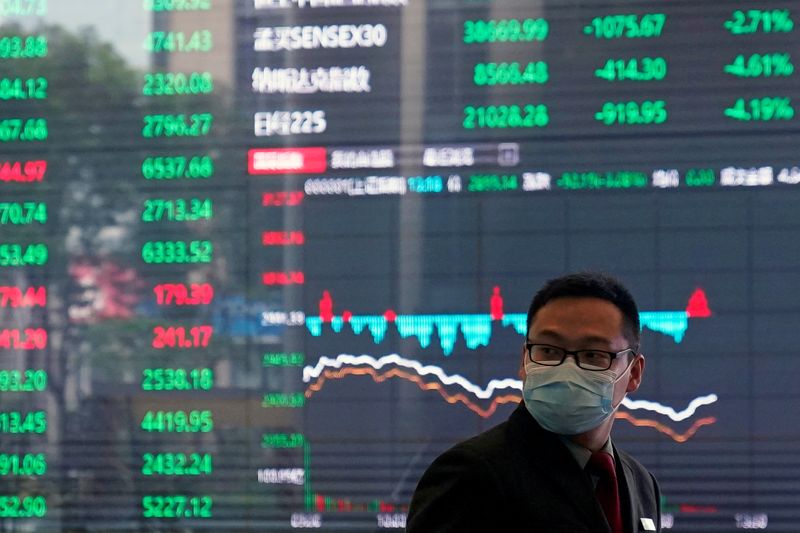By Marc Jones
LONDON (Reuters) - World stock markets fell for a third day running on Thursday after a sobering warning from the World Health Organization that the coronavirus may never go away.
The head of the Federal Reserve quashed talk of U.S. interest rates going negative to kickstart investment and new outbreaks of the virus in South Korea and China and some dour assessments of the global economy aroused concern too.
Europe's main bourses sank 1.5% in early moves (STOXX) as traders once again took shelter in safe-haven government bonds.
"The path ahead is both highly uncertain and subject to significant downside risks," the Fed Chair Jerome Powell said of the economy, as he warned of a recession worse than any since World War Two.
His suggestion that the Fed’s firepower may not be sufficient to avert deep damage also clearly spooked markets. He called for additional fiscal support but a $3 trillion stimulus bill seems to have run aground with senate Republicans for now.
Asian markets had followed Wall Street lower overnight with MSCI's broadest index of Asia-Pacific shares finishing down (MIAPJ0000PUS) 1.3% and Japan's heavyweight Nikkei (N225) closing 1.75% in the red.
"We don't think the market is going to re-test the lows, but it's probably seen its best also, so I'm expecting a correction," said Tony Huntley, chief investment officer at Melbourne-based fund manager Adansonia Capital.
"The issue is whether we get a second wave (of coronavirus infections) ... that would be my greatest fear."
China has re-imposed movement restrictions near its borders with North Korea and Russia after a new outbreak was detected there and South Korea is working to contain an outbreak centred around bars and nightclubs in Seoul.
"It is important to put this on the table: this virus may become just another endemic virus in our communities, and this virus may never go away," WHO emergencies expert Mike Ryan told an online briefing on Wednesday.
Bonds and the dollar (=USD) had both rallied after Fed Chief Powell talked down the prospect of negative interest rates in the United States. Yields on benchmark U.S. 10-year Treasuries (US10YT=RR) fell to 0.6185% having been 0.74% just over a week ago.
European bond yields continued to fall for the most part too, despite more government spending which will ramp up debt levels. Italy's government had unveiled its second fiscal package on Wednesday evening, worth 55 billion, or roughly 3% of its 2019 nominal GDP.
Deutsche Bank (DE:DBKGn) now estimates that Rome's debt-to-GDP level will hit an eyewatering 200% next year.
"Swings in risk appetite after yesterday's Mr. Powell’s cautious tones and more in general related to the developments of lockdown measures will remain an important driver," UniCredit's analysts said.
RECORD FALL
In the commodity markets, a surprise drawdown of U.S. inventories helped oil prices make around 2%, but the broader caution capped rises. The International Energy Agency (IEA) estimated oil demand will see a record fall in 2020, keeping Brent just below $30 a barrel.
Gold pulled back from a one-week high hit early in the Asian session, but held comfortably above $1,700 an ounce at $1,711.20.
Markets are looking ahead to the latest U.S. jobless claims data at 1230 GMT.
Equity markets have wavered since April's rally as investors and authorities try to weigh the risks of re-starting economies quickly against the financial ruin that lockdowns have wrought, while worrying about a flare-up infections.
Australian jobless data bought the latest sign of trouble, with a record plunge in employment dragging the currency to a one-week low of $0.6420.
Already bleak expectations and strong demand for Aussie bonds kept it from steeper falls.
In the United States, the Trump Administration is pressing on with re-opening plans despite urgings of caution from medical experts.
"We're going to slowly open the economy," U.S. Treasury Secretary Steven Mnuchin told Fox News on Wednesday. "But there is also a risk that we wait too long, there is a risk of destroying the U.S. economy and the health impact that that creates."
Caution is also prevailing in Europe and the Antipodes, where restrictions are beginning to relax.
"Global markets are still licking their wounds, and while equities remain robust, gains are slowing," said Societe General FX strategist Olivier Korber.

"A second pandemic wave is unfortunately not a tail risk, so the full extent of the economic damage may be underestimated," he said, recommending a long position in euro/kiwi (EURNZD=) which has gained nearly 9% this year as market volatility has increased.
